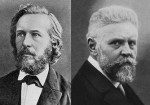An ongoing review of race science, the focus in this installment continuing on Fritz Lenz and characteristic mental traits, including the jewish fondness for Lamarckism and the Nordic fondness for objectivity.
Excerpts taken once again from science historian Robert N. Proctor’s Racial Hygiene: Medicine Under the Nazis:
Most curious of all, perhaps is Lenz’s belief that the tendency toward “Lamarckism” is a genetically selected racial characteristic. The jew, Lenz writes, has a peculiar fondness for Lamarckism, the doctrine of the inheritance of acquired characteristics. Hand in hand with this, “there usually goes a dislike of Darwinism, of the doctine that the origin of species has been affected by the ‘cruel’ process of natural selection, not by way of the ‘peaceful’ inheritance of acquired characteristics.” Lenz’s explanation of the jewish inclination toward Lamarckism is remarkable:
The jewish inclination toward Lamarckism is obviously an expression of the wish that there should be no unbridgeable racial distinctions. For instance, it is extremely characteristic that Kammerer, who was himself both a jew and a Lamarckian, should write that “the denial of the racial importance of acquired characteristics favors race hatred.” I am personally acquainted with jews of high mental attainments who feel themselves to belong to the German people and to German civilization, and to whom, therefore, it is a great tragedy of their lives that they should be looked upon as aliens. If acquired characters could be inherited, then, by living in a Teutonic environment and by adopting a Teutonic culture, the jews could become transformed into genuine Teutons. This enables us to understand why the Lamarckian doctrine should make so strong an appeal to the jews, whose fate it is to exist everywhere among the Gentiles as a sharply differentiated minority. But this, of course, can make no difference to the fact that the Lamarckian doctrine is an illusion … jews do not transform themselves into Germans by writing books on Goethe.
More accurately, jews regard themselves as distinct from all others, and wish that those others do not. The attempt to pathologize opponents, especially in terms of “denial” and “hate” is characteristically jewish. Jews wish only that nobody notice that they do not wish to become Teutons, or anything else, because then they would no longer be jews.
Also from jewish ethnographer Raphael Patai’s The Jewish Mind:
Lenz’s attitude to the “jewish race” was unsympathetic but correct.
Lenz offers an ingenious explanation for the jewish fondness for Lamarckism.
This bit from Proctor, quoted last week, bears repeating:
Many jews, Lenz reports, in the process of adapting to essentially alien surroundings, have tried to imitate the customs and appearances of their hosts in order to blend in and appear less conspicuous. He considers this a typical case of “animal mimicry,” commonly observed “wherever a living creature gains advantages in the struggle for existence by acquiring a resemblance to some other organism.” It is for this reason, he argues, that jews are not just shrewd and alert, not just diligent and persevering, but possess as well an unusual sense of empathy – an ability to put themselves in the place of outhers and to induce others to accept their guidance.
Likewise this bit from Patai’s “The Myth of the Jewish Race”:
The systematic extermination of 6 million jews by Nazi Germany and its satellites was the culmination of the notion that the jews were a race, with distinct inherited physical and mental characteristics, alien to the Gentile population in whose midst they lived, and overtly or secretly inimical to it.
In other words, the notion that jews are distinct from Whites is bad for jews, because it leads to Whites realizing that jews are bad for Whites, which is bad for jews.
More from Proctor on Lenz’s evaluation of Nordic mental characteristics:
Lenz is confident that in most respects the mental powers of Nordic man exceed those of other races. He cites Fischer’s observations that the mentality of the Nordic includes industry, vigorous imagination, intelligence, foresight, organizing ability, artistic capacity, individualism, a willingness to obey orders, one-sidedness, an inclination toward meditation and flights of fancy, dislike for steady and quiet work, and devotion to plan or idea. To this Lenz adds the qualities of self-control, self-respect, respect for life and property, desire to know the unknown, a certain wander instinct, and fondness for the sea. According to Lenz, the Nordic mind strives above all else for clarity; Nordic idealism represents a “healthy realism,” a sense of the actual and the essential. He also maintains that the deficiency of historical and geographical knowledge one finds among the British and the Americans is typically Nordic: the Nordic has less a sense of particular occurences than of law and principle. This in turn he links with the Nordic’s individualism and also his natural tendency toward Protestantism over Catholicism. Selection has aided the Nordic – his cold northern climes have selected for intelligence and mastery of techniques. The same climate that among the the Mongols selected for freedom from wants and capacity to endure has selected in the Nordic a love of order and of cleanliness; a love of sport, of danger, and of war; and a certain need for distance or detachment from other men and things (what Lenz calls Nietzsche’s “pathos of distance”). Hence “objectivity is a Nordic racial trait.”
Such pronouncements may sound strange to the modern ear. Yet Lenz did in fact consider his science of race to be a neutral and objective science – indeed, he often warns against the dangers of “mixing values with science.” For Lenz, human racial variation is simply a fact that science is called on to analyze; the purpose of constructing a racial typology is not to rank the various races in any moral sense:
No race can be regarded as either “higher” or “lower” than another, because all such estimates of value imply the application of some standard of value other than that of race per se.
At several point Lenz takes pains to convince his reader that he is not an anti-semite. He suggests that “contrary to the opinion of the ‘anti-semite’,” the jews have played a constructive role in history: the jew tears down, but generally with the aim of building up.
Here is a fundamental distinction in mentality. In spite of the objective ideals of high-minded Whites, including race scientists like Lenz, the struggle amongst groups extends even into science – with jews ultimately tearing down the science of race specifically because they regard it as bad for jews.
The podcast will be broadcast and available for download on Tuesday at 9PM ET.
Podcast: Play in new window | Download











